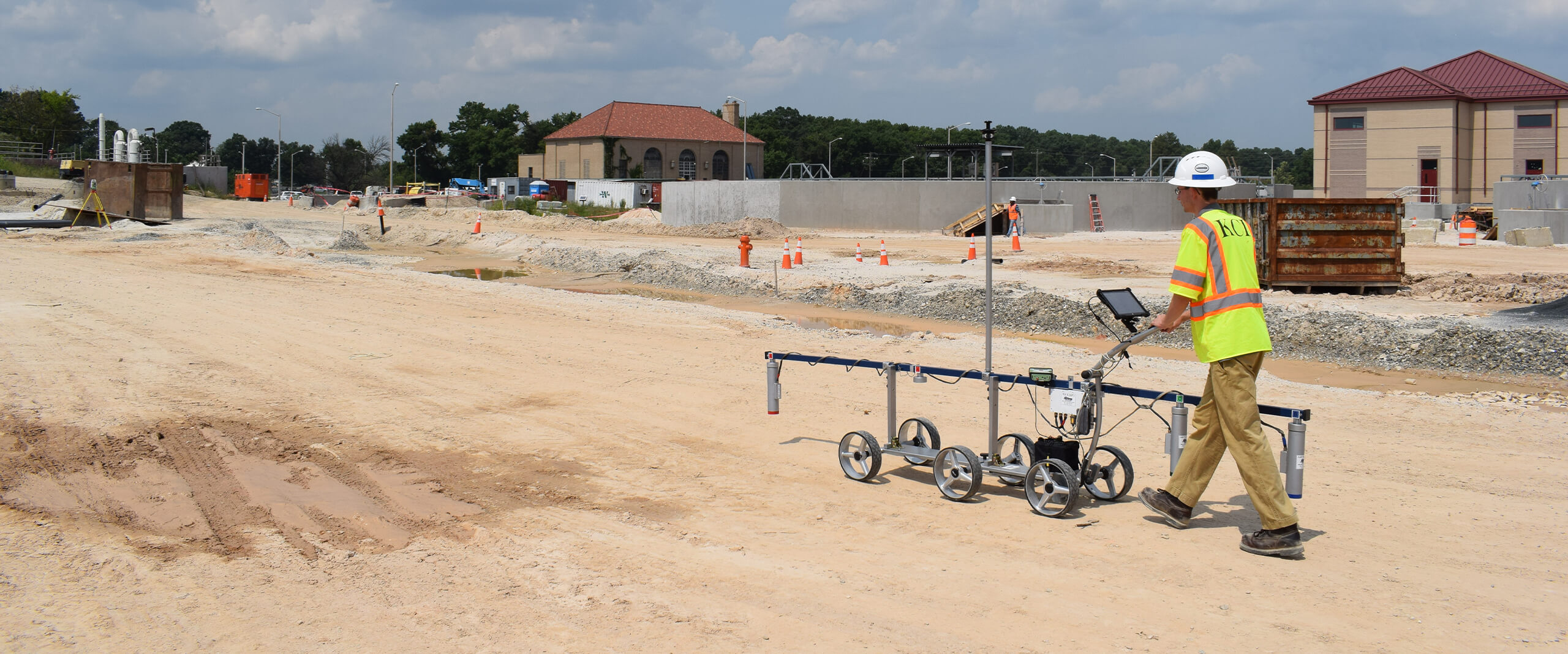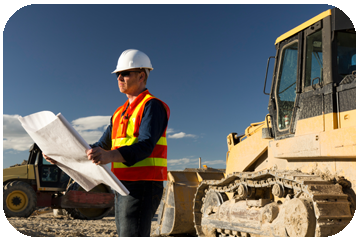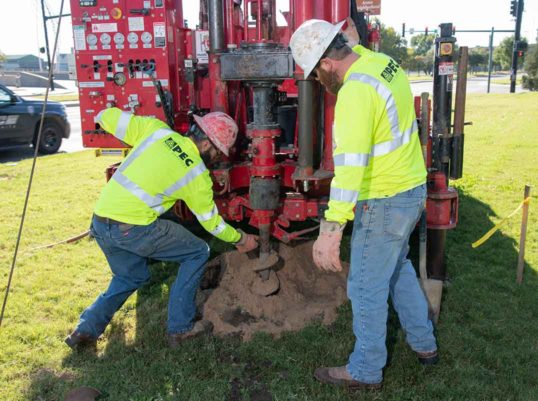What Does an Engineer of Record Do? Comprehending Their Important Responsibilities
What Does an Engineer of Record Do? Comprehending Their Important Responsibilities
Blog Article
Comprehending the Vital Role of the Geotechnical Industry in Modern Construction Projects and Infrastructure Growth
The geotechnical sector is a cornerstone of modern construction and framework growth, supplying essential understandings into dirt habits that directly influence task end results. With sophisticated soil assessments and ingenious engineering solutions, geotechnical experts not just make certain architectural integrity however also address sustainability issues amid advancing environmental criteria.
Value of Soil Evaluation
Soil assessment plays a critical role in the geotechnical sector, serving as the structure for informed decision-making in building and construction tasks. Exact soil examination is crucial for figuring out the suitability of a site for various kinds of structures, consisting of property homes, business structures, and bridges. By evaluating dirt composition, density, stamina, and dampness web content, designers can anticipate possible obstacles and alleviate dangers linked with ground instability, disintegration, and negotiation.
The assessment procedure typically entails a collection of tests and observations that provide crucial info concerning the subsurface problems. This data educates the style and construction procedures, guaranteeing that frameworks are developed on solid ground with adequate assistance. Comprehending the dirt profile makes it possible for engineers to choose ideal building approaches and materials, maximizing source usage and decreasing costs.
Along with ensuring structural stability, dirt assessment adds to ecological sustainability. By identifying prospective contamination or adverse impacts on bordering communities, engineers can carry out strategies to safeguard these natural deposits. In general, extensive dirt evaluation is essential in the geotechnical field, underpinning the safety and security, efficiency, and ecological responsibility of building and construction projects.
Secret Geotechnical Techniques
A selection of essential geotechnical strategies are utilized to improve the security and evaluate and efficiency of construction sites. One foundational approach is dirt sampling and testing, which allows designers to figure out the physical and chemical residential properties of the ground. This info is vital for making educated choices regarding structure layout and building and construction approaches.
Another necessary technique is website characterization, which involves the thorough assessment of dirt and rock conditions with approaches such as borehole drilling and in-situ testing. Methods like Requirement Infiltration Examinations (SPT) and Cone Penetration Examinations (CPT) offer valuable information on dirt toughness and stratigraphy.
Ground improvement techniques, such as soil stabilization and grouting, are likewise vital in improving the load-bearing ability of weak dirts. These approaches can alleviate negotiation and enhance total site problems.
Furthermore, incline stability evaluation is vital for determining possible landslide threats and making sure the safety of excavations. This analysis commonly employs mathematical modeling and restriction balance approaches to forecast dirt behavior under numerous problems.
Including these geotechnical strategies right into construction planning not just enhances project outcomes yet likewise makes certain the long-lasting sustainability of infrastructure development.
Influence On Building Security

Additionally, efficient geotechnical design entails carrying out mitigation methods for recognized risks. This may consist of soil stablizing techniques, preserving structures, or drainage systems to alleviate hydrostatic stress. By dealing with these variables, building and construction teams can lower the probability of mishaps and improve worker security.
In addition, continuous monitoring of site conditions is important during construction. Geotechnical instruments can provide real-time information relating to ground motion and stability, enabling prompt interventions when required.
Essentially, the geotechnical sector plays a pivotal role in protecting building and construction tasks. By focusing on ground integrity and employing strenuous assessment methods, the geotechnical industry not only secures the labor force yet additionally adds to the long life and integrity of created framework.
Sustainability in Geotechnical Practices

Furthermore, geotechnical engineers are now employing advanced technologies, such as geosynthetics, which enhance soil stability while reducing the volume of material called for. This not just preserves sources however likewise causes less waste generation (consulting engineer). The assimilation of lasting style principles into geotechnical design urges the usage of renewable resource resources in building and construction procedures, additionally decreasing carbon emissions
By carrying out these analyses, geotechnical experts can create techniques that minimize unfavorable results, guaranteeing conformity with environmental guidelines. Overall, the emphasis on sustainability within geotechnical techniques not only adds to the long life and resilience of facilities yet also advertises a liable method to land and resource monitoring.
Future Trends in Geotechnical Engineering
Advancement is driving the future of geotechnical design, as emerging methodologies and innovations improve the sector. The integration of sophisticated information analytics and artificial intelligence is readied to reinvent site investigation and danger evaluation, making it possible for designers to make even more informed decisions based on real-time data. The use of geosynthetic materials is gaining traction, providing sustainable services that enhance soil stability and decrease environmental impact - geotechnical engineers.
Another substantial fad is the fostering of automated and robotic systems for monitoring and building procedures. These innovations not only enhance precision but additionally boost security by decreasing human participation in harmful atmospheres. Additionally, the application of Building Information Modeling (BIM) in geotechnical layout promotes enhanced partnership among stakeholders, maximizing project distribution and minimizing costs.
As environment modification postures new challenges, the market is progressively focusing on strength and adaptability in layout practices, making certain facilities can withstand extreme climate events. Ultimately, the continuous fad toward sustainability will certainly drive innovation in green materials and techniques, aligning geotechnical engineering with more comprehensive environmental goals. Jointly, these trends will form an extra efficient, lasting, and durable geotechnical landscape for future jobs.
Verdict

The geotechnical sector is a foundation of contemporary building and infrastructure development, giving essential understandings right into soil behavior that straight influence project outcomes. geo tech engineer.Soil analysis plays an essential function in the geotechnical market, serving as the structure for notified decision-making in construction jobs. In general, comprehensive dirt evaluation is essential in the geotechnical area, underpinning the security, efficiency, and ecological obligation of building and construction jobs
Construction safety and security is substantially influenced by geotechnical methods, as the stability and honesty of the ground directly influence the general safety and security of a building and construction website.In conclusion, the geotechnical sector is essential in modern-day building and framework advancement, giving vital analyses that guarantee architectural integrity and safety and security.
Report this page